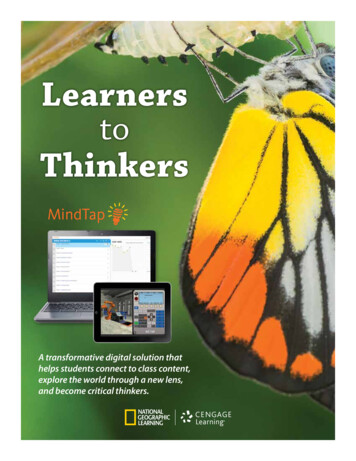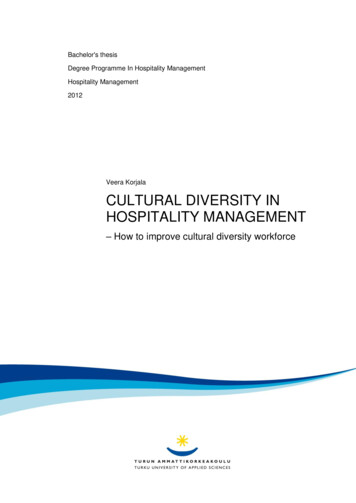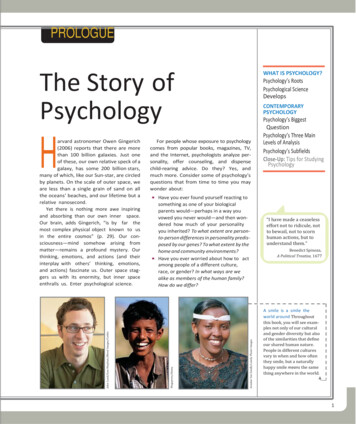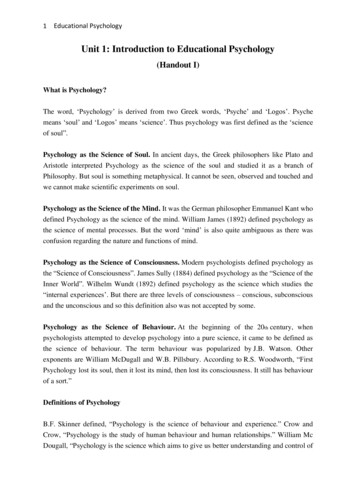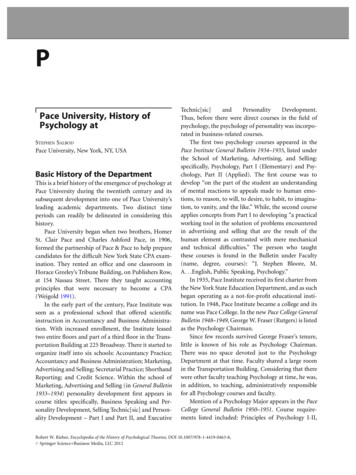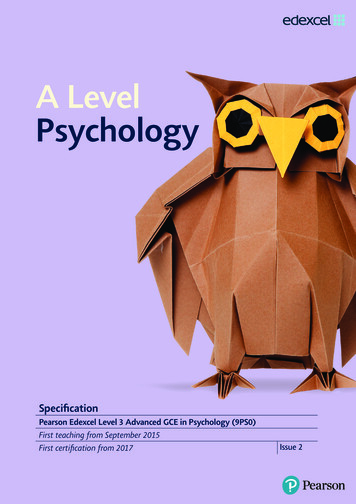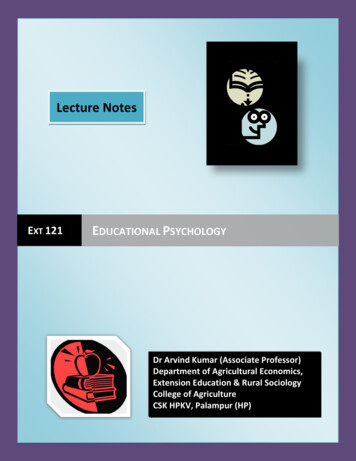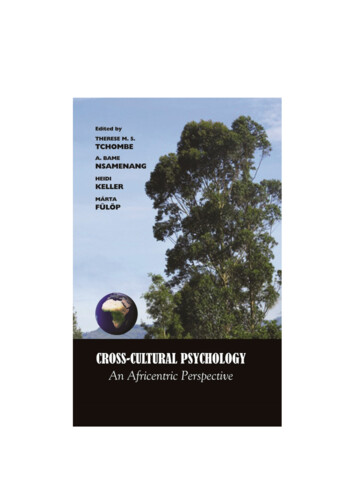
Transcription
CROSS-CULTURALPSYCHOLOGYAn Africentric Perspective
iiiCROSS-CULTURALPSYCHOLOGYAn Africentric PerspectiveEdited byTherese M. S. TchombeA. Bame NsamenangHeidi KellerMárta FülöpDESIGN House, Limbe, Cameroon2013
Published byDESIGN House, LimbeA Division of Bukhum Communications, Gainesville, Florida USA , 2013 CRCFDEAll rights reserved. No part of this book may be reproduced, stored in aretrieval system, or transmitted in any form or by any means, electronic,mechanical, photocopying, recording or otherwise, without the priorpermission of the Centre for Research in Child and Family Development& Education (CRCFDE)P.O. Box 901, Limbe, Cameroon.First published 2013Typeset in Baskerville 10.5/12.5 ptsBy DESIGN HouseP.O. Box 321, LimbeISBN 978-9956-26-069-xThe editors wish to acknowledge the financial assistance ofthe International Association for Cross-Cultural Psychology (IACCP),the International Development Research Center (IDRC) ,and the University of Buea (UB).
vCONTENTSList of TablesviiiList of FiguresixEditor BiographiesxiAuthor BiographiesxiiPrefacexviiIntroductionxixTherese M.S Tchombe & A. Bame NsamenangPART ONE: EPISTEMOLOGY AND CROSS CULTURAL RESEARCHC H A P T E R 1: Epistemologies in Cross-Cultural Psychology: anAfricentric AppraisalT.M. S, Tchombe, A. B. Nsamenang, J. Lah Lo-ohC H A P T E R 2: Cultures in the Biology of Human DevelopmentA. Bame Nsamenang & Rita A. Akum315C H A P T E R 3: Applications of a Cultural Psychology Approach in TwoStudies of Human Development in Zambia29Robert SerpellC H A P T E R 4: Emics and Etics in Cross-Cultural Psychology: Towards aConvergence in the Study of Cognitive Styles46Pierre DasenPART TWO: RESEARCH METHODS AND TESTINGC H A P T E R 5: Use of a Western Standardized Test inDefining African PerspectivesOumar Barry & Marian ZeitlinC H A P T E R 6: Methodological and Ethical Issues:Thoughts and ReflectionsRonald Fischer6582
PART THREE: PERSPECTIVES ON CULTURES IN AFRICAFROM A PSYCHOLOGICAL POINT OF VIEWC H A P T E R 7: On the Distinctiveness and Importanceof the Cultures of Sub-Saharan AfricaPeter B. Smith99C H A P T E R 8: Lessons from Africa Revisited:Ecopsychological Pathways of Development112Heidi KellerPART FOUR: CHILDREN’ S DEVELOPMENT FROM AN AFRICANPERSPECTIVEC H A P T E R 9: Socialization Models for Transitions From EarlyChildhood to Adolescence in African Migrant Families in Europe andAmerica131Therese M. S. Tchombe & Moses MbangwanaC H A P T E R 10: African Perspectives on Gender DevelopmentDeborah L. Best149C H A P T E R 11: Childhood Play in Cross-Cultural PerspectiveLilian F. Wiysahnyuy162C H A P T E R 12: Adoption and Fostering: Traditional and ContemporaryChild Welfare Strategies in Sub-Saharan Africa 191Judith L. GibbonsPART FIVE: DIFFERING PERSPECTIVES: CROSS CULTURALCOMPARISONSC H A P T E R 13: Protoconversation and Protosong as Infant’sSocialization EnvironmentCarolin Demuthm211C H A P T E R 14: Different Faces of Autonomy: Mother-Child Past EventConversations Across Cultural Developmental Pathways234Tulviste, T., Tõugu, P., Keller, H., Schröder, L. & De Geer, B.
viiC H A P T E R 15: Challenges to Finding Similarities and Differences inCross-Cultural Infancy Research248Bettina LammC H A P T E R 16: Cross-Cultural Forgiveness Processes inCameroonian and American Young Citizens262Sheri A. Nsamenang, Ian T. Williamson & Steven J. SandagePART SIX: CULTURE AND HUMAN SOCIAL CAPITALC H A P T E R 17: Language Diversity, Bilingualism, and MultilingualismAcross Cultures: The Quest for Bilingual Education281Esther F. AkinsolaC H A P T E R 18: Perspectives in Indigenous African and WesternEducation and Learning295Therese M. S. TchombePART SEVEN: APPLIED CROSS-CULTURAL PSYCHOLOGYC H A P T E R 19: Competition and Cooperation in Sub-SaharanAfrica: A Cross-Cultural ApproachMarta Fülöp & Noémi Büki317C H A P T E R 20: Industrial and Organizational Psychology in Westernand Central Africa340Sharon GlazerC H A P T E R 21: Immigration and Parenting from an African Perspective:Implications for Well Being, Policyand Practice358Relindis D. YovsiC H A P T E R 22: Cultural Factors in the Etiology, Expression, Transmissionand Management of Ill-Health in the African Context373Amina Abubakar & Fons Van de Vijver
LIST OF TABLESTable 4.1: Components of n‘glouèlê, the Baoulé definition of intelligence52Table 5.1: Analysis of the content of the Bayley cognitive test69Table 6.1.: Underlying values of the universal declaration of ethicalprinciples for psychologistsTable 7.1: World Values Survey scores for sub-Saharan nations87102Table 7.2: Estimates of In-group Favouritism in Sub-Saharan Africa107Table 11.1: Obtained frequencies for children‘s play in relationtoOriginality180Table 11.2: Summary of Chi-square (x2) with data in Table 11.4.180Table 11.3: Obtained Frequencies for play and children‘s divergent thinking 181Table 11.4: Summary of x2 with data in Table 11.2181Table 11.5: Obtained frequencies for children‘s play in relation toimagination182Table 11.6: Summary of Chi-square with data in Table 11.4.182Table 11.7 Range of magnitude of relationship183Table 16.1: Differences between Cameroonians and Americans onForgivenessand Related Measures268Table 16. 2: Regression Model for Forgiveness – Cameroon269Table 16.3: Regression Model for Forgiveness - America269Table 22.1: Perceptions of Causes of Ill-health in the DemocraticRepublic of CongoTable 22.2: Summary of cultural factors implicated in the spread of HIV375381Table 22.3: Various ways in which culture impacts on mental healthidentified by Tseng (2007)as384Table 22.4: Four-Stage Approach to Tool and Programme DevelopmentAdaptation386and
ixLIST OF FIGURESFig. 3.1: Cultures of interpretation (perspectives)31Fig. 3.2: Multiple perspectives on the significance of schooling33Fig. 3.3: Three zones of distance within two observers‘ perspectives34Fig. 3.4: The extractive recruitment model of schooling43Fig. 5.1: Current Educational Performance in Senegal66Fig. 5.2: Mean scores of the Louga group, compared to the test norms69Fig. 5.3: Capacity to count of children in the Louga villages by month of age 70Fig. 5.4: What mothers teach their three-year-olds71Fig. 5.5: Differences in counting ability by mother‘s report of teaching72Fig. 5.6: Projected increase in Bayley cognitive scores with teaching73Fig. 5.7: Differences in mean scores in more rural vs more urban localgovernment units74Fig. 5.8: Percentage of zeros in the answers of 61 village children bytype of task on the Bayley75Fig. 5.9: Lack of age progression in comparing sizes, weights, quantities76Fig. 5.10: Tasks and errands performed by three-year-old children in Louga 77Fig. 9.1: Variation of age brackets with respect to socialization models139Fig. 9.2: Socialization Model141Fig 11.1: Children preparing corn fufu and huckle berry170Fig 11.2: Children producing slippers using banana suckers171Fig 11.3: A child teaching invisible learners172Fig 11.4: Trapping insects with traps they produced173Fig 11.5 Bird hunting using catapults173Fig. 11.6: Children at the entrance of a village head compound174Fig. 11.7: Children playing at hospital175Fig 11.8: Children using charcoal as paint176Fig. 11.9: Children baby-sitting parallel to each other177Fig. 11.10: Production of musical instruments (drum and rattle) using tins,plastic papers, stones and thread177Fig. 14.1: Mean number of times each category of content wasmentionedby mothers per event239Fig. 14.2: Mean number of times each category of content wasmentionedby children per event240Fig. 14.3: Mean number of each type of maternal agency referencesper event241
Fig. 15.1: Drop out rate in the habituation paradigm per experimentalcondition252Fig. 15.2: Percentage of babies who showed social interaction behaviorin each experimental condition253Fig. 15.3: Percentage of babies, who do not kick or kick very little inthe mobile task at 3 and 6 months of age255Fig. 22.1: A summary of the impact of HIV at various levels379
xiEDITOR BIOGRAPHIESTherese Mungah Shalo Tchombe, a Cameroonian, is Professor Emeritus andHonorary Dean at the University of Buea. She obtained her Ph.D. inDevelopmental Psychology and Education at the University of Bristol in the UKwith specialization in Applied Cognitive Developmental Psychology. Her researchinterests are in the domain of cognitive processes in childhood and the implicationof culture, teacher factors and gender. She has served and participated in capacitybuilding in research for emerging African young scholars in West and CentralAfrica. Prior to her appointment as Dean of the Faculty of Education at theUniversity of Buea (Cameroon), Professor Therese Tchombe was the Head ofDepartment of Education at Ecole Normale Supérieure (ENS) Yaoundé. SinceNovember 2009, she has held the UNESCO Chair for Special Needs Education atthe University of Buéa. She is a member of the Cameroon Academy of Sciencesand of other international associations. She is the founding director of the Centerfor Research in Child and Family Education and Development that generouslyhosted the development of and editorial work on this project.A. Bame Nsamenang is professor of psychology and learning science at theUniversity of Bamenda, Cameroon, and the founding director of HumanDevelopment Resource Centre (HDRC), a research and service facility(www.thehdrc.org). His research seeks to understand and enhance Africa‘s futuregenerations – children and youth. He is into production of Africentric literature andtools for early childhood development (ECD) and teacher education and haspublished influential works in developmental and educative sciences. He networksand strategizes for African voices into developmental and educational sciences aswell as cross-cultural psychology discourses and literature. He is a member of theExecutive Committee of the International Society for the Study of bBehavioral Development (ISSBD) (2012-2018).Heidi Keller is a Professor of Psychology at the University of Osnabrueck and theDirector of the research unit "Culture, Learning and Development" of the LowerSaxonian Institute of Early Childhood Education and Development. Her researchprogram is directed at the study of cultural pathways of development synthesizingbiological predispositions with cultural emphases. She directs a multiculturallongitudinal research program integrating quantitative and qualitativemethodology. She has undertaken diverse field visits in different cultural sites andtaught at different universities in many countries.Márta FülöpMárta Fülöp is the scientific Director of the Institute of Cognitive Neuroscienceand Psychology of the Natural Science Research Centre of the Hungarian Academyof Sciences where she is the Head of the Cultural Comparative PsychologyDepartment. She is also Professor of Social Psychology in the Institute forPsychology at the Hungarian Academy of Sciences. Her main research interest is inthe psychology of competition, especially in cross-cultural perspective.
AUTHOR BIOGRAPHIESAmina Abubakar studied developmental and cross-cultural psychology and obtainedher PhD degree from Tilburg University in 2008. She is currently a post-doctoralresearch fellow at the same institution. Her research focuses on the developmentaloutcomes of at-risk children in resource poor settings. She has extensive researchexperience in Kenya. She has published several peer reviewed journal articles and bookchapters mainly in developmental, health and cross-cultural psychology.Carolin Demuth studied psychology at the Free University of Berlin andreceived her Ph.D. from the University of Osnabrueck where she presently holds aresearcher and lecturer position in the Culture and Development Department. Herinterests are in the dialogical interplay of human development and culture, particularlythe role of discursive practices and narrative identity. She also holds a strong interest inqualitative methods and epistemology. She teaches developmental psychology andqualitative methods. Her Ph.D. thesis (2008) is entitled Talking to infants: how cultureis instantiated in early mother-infant interactions: the case of Cameroonian farmingNso and North German middle-class families.Bettina Lamm received her Ph.D. from the University of Osnabrueck, Germany and isnow a senior researcher at the Department of Culture and Development, University ofOsnabrueck. Her research interests include learning and memory development acrosscultures as well as parenting and sibling interactions from an intercultural perspective.Boel De Geer has a Ph.D. in general linguistics from Lund University. She spent fouryears as a lecturer at Lund University and is now Associate Professor of Swedish andProgram Director of the Education Studies for Primary School Years 1-3 at SödertörnUniversity, Sweden. Her present fields of research are language development andcross-cultural comparisonsDeborah L. Best is the William L. Poteat Professor of Psychology at Wake ForestUniversity, USA, where she previously served as Chair of the Psychology Departmentand was the first woman to serve as Dean of the College. She is active in theInternational Association for Cross-Cultural Psychology as an Honorary Fellow,President (2000-2002), and Treasurer (1988-1997), and in the Society for CrossCultural Research as President (2011-2012). She has served as Associate Editor of theJournal of Cross-Cultural Psychology since 1996 and from July, 2012, served as Editorof JCCP. With Peter B. Smith, she co-edited the four-volume set, Cross-CulturalPsychology in the Sage Benchmarks in Psychology Series. Her research has focused onchildren‘s cognitive and social development, examining the development of genderrelated concepts among young children in the United States and other countries.Current research investigates gender and culture in relation to children‘s filial (home)responsibilities and how those impact children‘s social behavior and academicperformance.Esther Foluke Akinsola received her Ph.D. in developmental and clinical psychologyfrom University of Lagos where she is presently a Senior Lecturer in the Department of
xiiiPsychology. Her research interests include language learning and communication inbilingual infants and children, parental involvement in children and adolescentupbringing, parenting styles across cultures and the relationship between parentingstyles, rejection sensitivity, aggression and psychological wellbeing of children andadolescents across ethnic groups.Ian Williamson earned his Ph.D. in 2004 at the University of Minnesota. His researchinterests include forgiveness, positive psychology, and spirituality. He currently is theChair of Social and Behavioral Sciences at New Mexico Highlands University, andteaches several psychology classes to undergraduates and graduate students includingsocial psychology, positive psychology, and statistics for the social and behavioralsciences. In his spare time, he likes to do tai chi and play chess.Joseph Lah Lo-oh is Assistant Lecturer of Educational and Developmentalpsychology at the Faculty of Education of the University of Buea, Cameroon. Lo-ohholds a B.Ed. in curriculum and instruction, an M.Ed. in Educational Psychology, and aPhD in developmental psychology from the University of Buea, Cameroon. He isinterested in transitions research (from school to work, from adolescence to adulthood),and emerging adulthood in the Third World.Judith Gibbons is Professor of Psychology and International Studies at Saint LouisUniversity, a 2012 Fulbright scholar at the Universidad del Valle de Guatemala, andthe editor of International Perspectives in Psychology: Research PracticeConsultation. She is president-elect of the international organization, InteramericanSociety of Psychology, better known by its Spanish acronym, SIP, and the regionalrepresentative from North America for the International Association of Cross-CulturalPsychology (IACCP). Dr. Gibbons has published widely in international psychology,including a book co-authored by Deborah Stiles titled The Thoughts of Youth: AnInternational Perspective on Adolescents‟ Ideal Persons and a recent book, co-editedwith Karen Smith Rotabi titled Intercountry Adoption: Policies, Practices, andOutcomes.Lilian Fai Wiysahnyuy hails from Kishong in Bui Division in Cameroon. She studiedCurriculum Studies with bias in the teaching of History at the Bachelor‘s level. Sheholds an M.Ed in educational psychology from the University of Buea since 2007 andis currently a D. Phil candidate in the same field of study. Lilian Fai is a professionalteacher presently serving in the Department of Science of Education at the HigherTeacher Training College, University of Bamenda. Her research interests are indevelopmental and educational psychology with overflows in sociology of education.Lisa Schröder finished her Ph.D. in 2012 in Heidi Keller's Department of Culture andDevelopment at the University of Osnabrück. For her thesis she investigated motherchild conversations about past events in various cultural contexts. Based on theseresults as well as the literature, she has developed a training program for Germanpreschool teachers. Teachers are trained to use specific conversation techniques inorder to create a language inspiring every-day life in kindergarten. Central to theconception is the consideration of culture specific conversation styles to encourageconversational contributions from children of various cultural backgrounds. At themoment, she is coordinating an intervention study in order to evaluate the program.
Furthermore, she is doing research in children‘s cognitive styles across differentcultural contexts as well as in German migrant populations.Noemi Büki is a young researcher at the Institute of Cognitive Neuroscience andPsychology of Natural Science Research Centre of the Hungarian Academy of Sciencesand a doctoral student in the Institute for Psychology or the Hungarian Academy ofSciences. Her main research interest is in the psychology of competition andacculturation in immigrant communities.Oumar Barry is teaching psychology at the Université Cheikh Anta Diop in Dakar,Senegal . He is a seasoned teacher of various university-level psychology courses andhas published extensively in psychology and child and youth development, and youngpeople‘s welfare. He is into extensive networks and NGO activities for the benefit ofchildren and youth. He has served as consultant on early childhood to several bodiesand agencies, including national and international NGOs and the World Bank. Hedeveloped the scientific contents of WEB, highly valued cyberspace data bases forSénégal, Kenya, Eretria, and Burundi.Peter B. Smith is Professor Emeritus of Social Psychology at the University of Sussex,UK. He is author or editor of ten books, including Leadership, Organisations andCulture (1988, with Mark Peterson), Understanding Social Psychology across Cultures(2006, with Michael Bond and Cigdem Kagitcibasi), Handbook of Cross-CulturalManagement Research (2008, with Mark Peterson and David Thomas), Cross-culturalPsychology (2009, with Deborah Best) and more than 150 other publications. For sixyears he was editor of the Journal of Cross-Cultural Psychology and is a formerpresident of the International Association for Cross-Cultural Psychology.Pierre R. Dasen is Professor Emeritus of Anthropology of Education and Crosscultural Psychology at the University of Geneva (Faculty of Psychology andEducational Sciences). He is the co-author (with J. Berry, Y. Poortinga, and M. Segall)of two widely circulated textbooks of cross-cultural psychology. His field of expertiseis cross-cultural developmental psychology, and particularly culture and cognition. Hewas a research assistant to J. Piaget at the University of Geneva, where he has beenteaching for twenty years; he has also been associated with the Australian NationalUniversity, Université de Montréal, University of Nairobi, and Universities of Nice,Fribourg, Lyon II and Ecole des Hautes Etudes de Sciences Sociales (EHESS) in Paris.He has carried out research in Australia, Canada, Côte d‘Ivoire, Kenya, Papua NewGuinea, Indonesia, India and Nepal. Dasen has been influential in founding theAssociation pour la Recherche Interculturelle (ARIC), a francophone association forcross-cultural research. A CV and list of publications (including papers to bedownloaded in pdf format) are available me/Pirko Tõugu is a doctoral student and researcher at the Department of DevelopmentalPsychology at the University of Tartu, Estonia. Her main interest is languagesocialization, with an emphasis on reminiscing socialization in different culturalcontexts and the connection between conversational practices and values.
xvRelindis D. Yovsi received her Ph.D. in cultural and developmental psychology fromthe University of Osnabreuck, where she later worked as a Research Associate. Shefurther pursued a Masters in Public Health Methodology at the School of PublicHealth, Free University of Brussels and started working as an independent professionalin early childhood care and development as well as in research and development. Herinterests are holistic early childhood development, cross-cultural infant and young childfeeding practices, maternal and child health, parenting-child relationship, and thedevelopment and implementation of comprehensive early childhood developmentprogrammes.Rita Akum was born and raised in Cameroon. She got interested in the role of culturesin the biology of human development while at the Higher Teachers Training College atthe University of Bamenda. Rita holds a B.Sc. degree in Journalism and MassCommunication from the University of Buea and a Diploma in Science of Educationfrom the Higher Teachers Training College, University of Bamenda. She is currently aTeacher Trainer at the Government Teacher Training College in Mbengwi. Herresearch interest is focused on sex education information provided to both in and out ofschool youths. Her goal is to work toward the crafting and provision of better sexeducation messages to the youths.Robert Serpell is Professor of Psychology at the University of Zambia (UNZA).Raised in England (Ph.D. 1969 experimental psychology, Sussex), he became anaturalised citizen of Zambia in 1978. His research has been published in a wide rangeof peer-reviewed journals, and in four books: Culture‟s influence on behaviour (1976),Mobilizing local resources in Africa for persons with learning difficulties or mentalhandicap (1984), The significance of schooling: life-journeys in an African society(1993), and Becoming literate in the city (2005). His main research interests arecultural aspects of human development, intelligence, multilingualism, literacy,assessment and intervention services for children with disabilities and their families,and educational curriculum development. From 1989 to 2002, he was Director ofApplied Developmental Psychology at the University of Maryland, Baltimore County,USA. He is a Fellow of the Association for Psychological Science, and Member of theInternational Executive Committee of the International Society for the Study ofBehavioral Development (ISSBD), whose biennial international congress he convenedin Lusaka in 2010. At UNZA, Professor Serpell has served as Department Head,Institute Director and Vice-Chancellor, and is currently Coordinator of CAPOLSA(Centre for Promotion of Literacy in Sub-Saharan Africa) and Coordinator of GraduateStudies in Psychology.Ronald Fischer is a Senior Lecturer at Victoria University of Wellington and a Fellowof the Centre for Applied Cross-Cultural Research. He received his Ph.D. from SussexUniversity. Much of his current research focuses on applications of cross-culturalpsychology in the areas of organizational, social, and political psychology, payingparticular attention to the function of values and norms for the behavior and well-beingof individuals and groups. He also has a keen interest in research methods and multilevel theory and modelling. He has published more than 100 articles, book chapters andprofessional research reports. Currently, he serves as an Associate Editor of the Journalof Cross-Cultural Psychology and the Asian Journal for Social Psychology and he isco-editor of the International Journal of Cross-Cultural Management. His work on
values and peacefulness received the 2010 Otto Klineberg Intercultural andInternational Relations Award by the Society for the Psychological Study of SocialIssues.Sharon Glazer earned her Ph.D. in Industrial/Organizational Psychology from CentralMichigan University, M.S. in Applied Psychology from University of Baltimore, andB.A. in Psychology from University of Maryland Baltimore County. She is a ResearchProfessor at University of Maryland, Center for Advanced Study of Language. Dr.Glazer was a Fulbright scholar to Hungary, Erasmus Mundus scholar to France andItaly, and International Studies Fellow and Global Studies Fellow at San Jose StateUniversity. Her research streams include cross-cultural organizational behaviorincluding occupational stress, social support, values, time, organizational attitudes andorganization development.Sheri A. Nsamenang was born and raised in Cameroon. She began doing forgivenessrelated research when pursuing her Master‘s degree in clinical psychology. Sheri gother B.S. and M.S. degrees at New Mexico Highlands University. She is currently aPh.D. candidate in Clinical Psychology at East Tennessee State University (ETSU). AtETSU she is a research assistant on a campus suicide prevention project called ETSUPEAKS (Prevention through Education Awareness and Knowledge of Suicide), whichis sponsored by The Substance Abuse and Mental Health Services Administration(SAMHSA). Her research interests include forgiveness, spirituality, protective factorsagainst suicide, rural mental health, and depression. Sheri‘s long term interests are towork with underserved populations and minorities, both in research and clinical work.She likes to be involved in her community. She is the Vice President of Shades ofAfrica, an organization for African students, and the Vice President of the GraduateStudent Association in Psychology.Steven J. Sandage, is Professor of Marriage and Family Studies at BethelUniversity in St Paul, MN, and a Licensed Psychologist in practice with Arden WoodsPsychological Services in New Brighton, MN. He is co-author of three books, ToForgive is Human, The Faces of Forgiveness: Searching for Wholeness and Salvation,and Transforming Spirituality: Integrating Theology and Psychology. He has alsoauthored articles and chapters in areas such as the psychology of forgiveness andspirituality, virtue, marriage and family therapy, differentiation of self, interculturaldevelopment, and suicide. His research has been funded by grants from the LillyEndowment, the John Templeton Foundation, and the Fetzer Institute, and he is aresearch member of the Fetzer Forgiveness Research Network and the Institute forResearch on Psychology and Spirituality (Rosemead School of Psychology, BiolaUniversity).Tiia Tulviste is Professor of Developmental Psychology at the University of Tartu,Estonia. She has a doctoral degree in psychology from the University of Moscow(1985) as well as a Ph.D. from Stockholm University (2002). Her research interestsinclude cross-cultural variation in the associations between socialization values andpractices and the development of self, speech and conversational skills in children,paying special attention to changing developmental contexts.
xviiPREFACEThis book reflects on the concept and practice of cross-cultural psychology withinAfrican cultural contexts. Except for a few invited chapters, it selectively focuseson papers presented at the international regional workshop on cross-culturalpsychology held in Buea, Cameroon, in 2009. We acknowledge Jacobs Foundationand the International Association for Cross-Cultural Psychology for funding theworkshop, with a spill over as the seed money for start off prepariation work onthis book. We take the opportunity to also acknowledge IRDC , the University ofand all those who have contributed to make this venture a reality and hope that thebook will serve and fill a gap in knowledge building and innovative thinking incross-cultural research.These chapters clearly underscore the fact that behaviour cannot be discussed outof its social-cultural and ecological context. As many chapters have clarified, therehas been a serious imbalance in the potentials of mainstream‘s explanativepsychological theories and epistemology to discuss the behavioural manifestationsof persons in non-western cultures. In which case, we believe that psychologicaltheories and knowledge systems based on western philosophy cannot be seen asuniversal in some if not most cases. The limits of Eurocentric dominatedpsychological perspectives create problems of understanding differences andsimilarities manifested in human functioning accounted for by cultural variations.Behaviour, especially cognitive behaviours, can be well understood when findingsof a study take into account the eco-cultural context and systems directingcognitive processes. This is critical because cultural systems, patterns, values,languages and other cultural tools (Vygotsky, 1978) mediate developmentalprocesses. Social constructivism, of course, has addressed the importance ofcontext-specific and participatory paradigms that culture and mind are coconstructed (Shweder, 1991). The point remains that behaviour is influencedthrough biological factors but implications of experiences drawn from one‘senvironment cannot be underestimated. At varying degrees, the chapters of thisvolume exemplify the uniqueness of psychological processes related to cognition,perception, emotion, religion, language, parenting, health practices, etc. Forexample, in the African context, can socialisation of childr
well as cross-cultural psychology discourses and literature. He is a member of the Executive Committee of the International Society for the Study of b Behavioral Development (ISSBD) (2012-2018). Heidi Keller is a Professor of Ps

